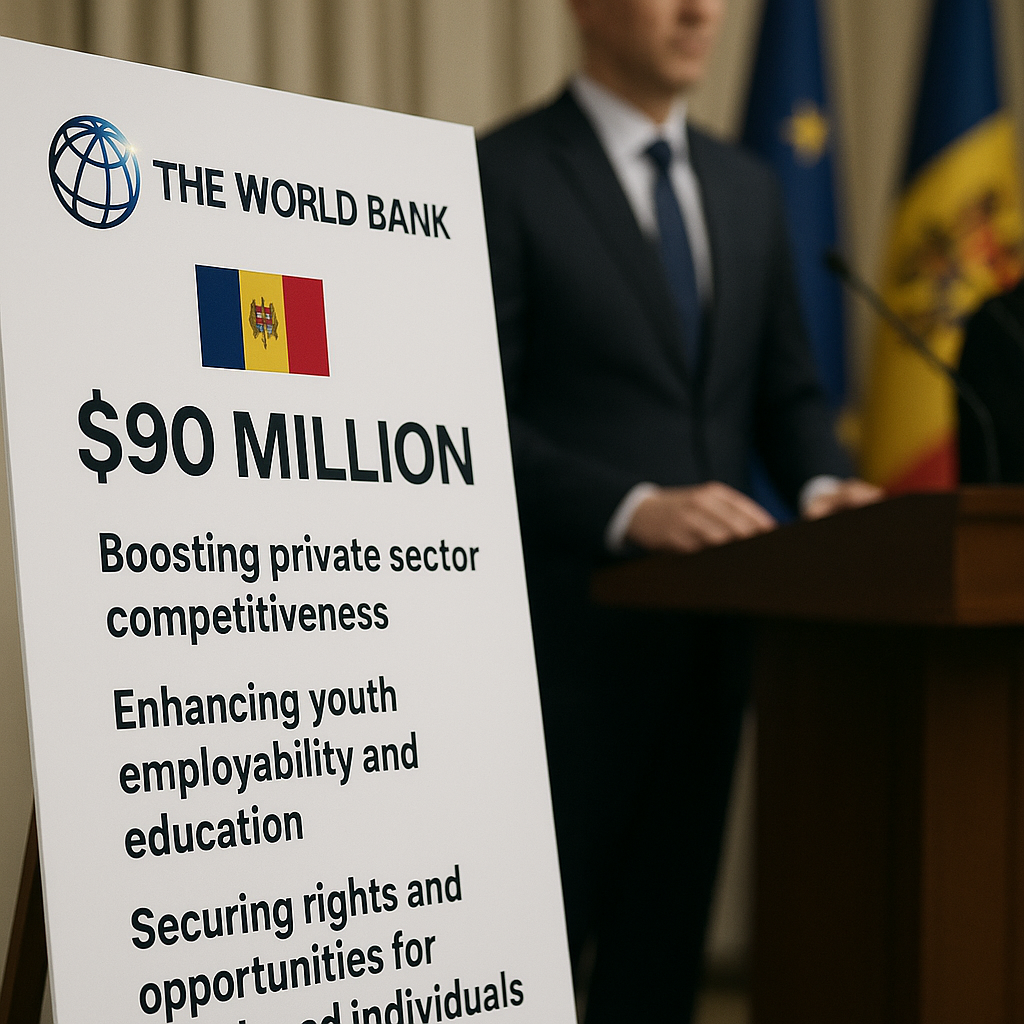World Bank Approves $90M Economic and Climate Reform Boost for Moldova
The World Bank’s current portfolio in Moldova includes projects in energy infrastructure, regulatory and business reform, agriculture, education, health, land valuation, roads, and water sanitation.

- Country:
- Moldova
The World Bank’s Board of Executive Directors has approved a new Development Policy Operation (DPO) of $90 million for the Republic of Moldova. Officially titled the Moldova Supporting Economic Opportunities and Climate Transition DPO, the program is designed to help Moldova pivot toward a more resilient, sustainable, and inclusive economy, while addressing vulnerabilities exposed by recent overlapping crises.
Building on Past Support and Strategic Partnerships
This operation continues and builds on two earlier World Bank-supported initiatives: the Moldova Emergency Response, Resilience, and Competitiveness DPO series and the Moldova Supporting Growth and Resilience DPO. Together, these efforts reflect the broader strategic intent outlined in the World Bank’s current Country Partnership Framework for Moldova, which prioritizes energy security, economic resilience, and EU alignment.
This DPO comes at a critical juncture for Moldova. Following a series of economic shocks—including the COVID-19 pandemic, the energy crisis, and the spillover effects of the war in Ukraine—the country’s economic model has been tested. These crises have affected household purchasing power, stretched government budgets, and exposed institutional weaknesses. The new operation is a targeted response to these challenges, offering financial and policy backing to steer Moldova toward sustainable recovery and reform.
Seizing the EU Integration Opportunity
Moldova’s ongoing journey toward European Union integration is a central theme of the World Bank’s support. The reforms under this DPO are explicitly aimed at aligning Moldova with EU standards in governance, market regulation, and energy transition. The operation is structured to catalyze economic transformation, helping the country transition from a consumption-driven model to one driven by a productive, innovative, and competitive private sector.
“Moldova has a unique opportunity to capitalize on the momentum of its EU candidacy. World Bank support will underpin critical reforms to establish a functional market economy, enhance competitiveness, equip the workforce with necessary skills, and bolster energy security,” said Inguna Dobraja, World Bank Country Manager for Moldova.
Key Pillars of the DPO: Reforms and Resilience
The new operation focuses on three pivotal reform areas:
-
Boosting Private Sector Competitiveness Reforms will strengthen market competitiveness by refining Moldova’s insolvency framework, allowing viable but distressed businesses to restructure. A fair competition framework will be introduced, and the overall investment climate will be improved to attract foreign and domestic capital.
-
Enhancing Youth Employability and Education Moldova will roll out a dual education model in universities, integrating academic learning with practical work experience in partnership with private sector employers. This aims to produce a more workforce-ready generation, reducing skills mismatches and improving long-term employment prospects.
-
Securing Rights and Opportunities for Displaced Individuals The DPO will help institutionalize long-term legal and social support for displaced populations, many of whom are refugees from the Ukraine conflict. This includes stable legal status, access to essential services, and tailored employment programs.
Embedded in a Broader International Support Architecture
The $90 million operation is not a standalone effort. It is part of a wider financial assistance package provided by international partners, including the International Monetary Fund (IMF), the European Union (EU), and the World Bank Group itself. In addition to the DPO loan, Moldova will receive:
-
A $7.7 million grant under the Moldova – Growth, Resilience and Opportunities for Well-being (M-GROW) program, and
-
An $8 million grant from the Global Concessional Financing Facility (GCFF), backed by the Government of the Netherlands, to help address the refugee crisis.
To date, Moldova has received $67.22 million in GCFF grants, enabling $557.91 million in concessional loans from the World Bank. These resources have supported Moldova’s host communities and refugees in areas such as education, emergency response, and inclusive economic policy development.
Long-Term Engagement and Future Prospects
Moldova became a World Bank member in 1992 and has since benefited from over $2.3 billion across more than 70 operations. The World Bank’s current portfolio in Moldova includes projects in energy infrastructure, regulatory and business reform, agriculture, education, health, land valuation, roads, and water sanitation.
Other arms of the World Bank Group are also active:
-
The International Finance Corporation (IFC) is engaged in private and public sector advisory and investment.
-
The Multilateral Investment Guarantee Agency (MIGA) provides risk insurance to stimulate private investments.
This new DPO marks a continuation of Moldova’s strategic shift toward economic resilience, modern public administration, youth engagement, and integration with Europe—fueled by robust international cooperation and a focus on inclusive, sustainable development.










